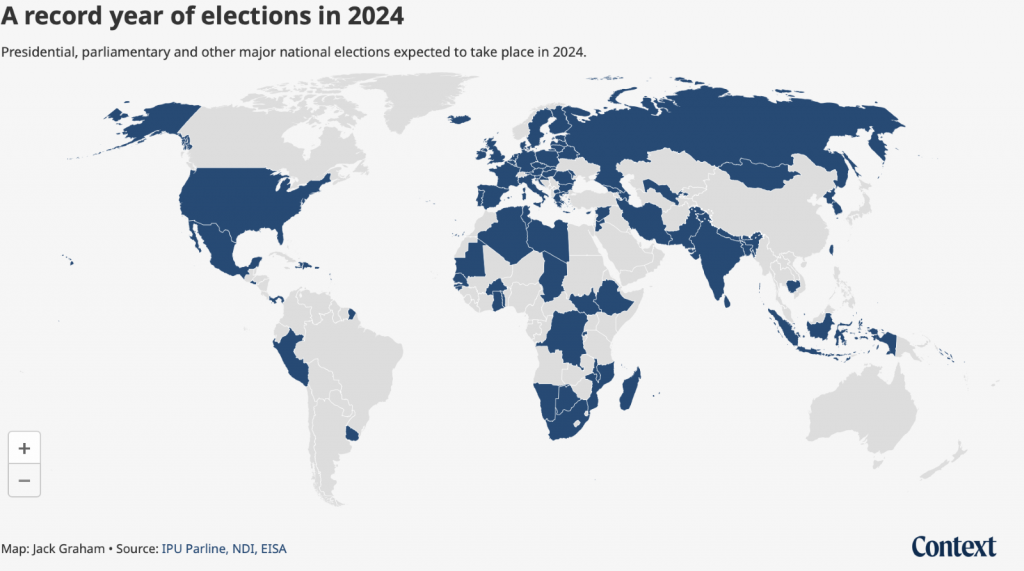By ESG Analyst Anaelle de Serres

Almost two months have passed since we entered 2024, a year with a record number of notable elections across the world. Indeed, presidential, parliamentary, and other major national elections should take place in 2024 across all continents except Oceania (see map). The countries holding elections this year are responsible for over 40% of GHG emissions, and among them are the biggest emitters of CO2. Most of these have experienced climate change on their territory, whether it manifested in the form of intense droughts and wildfires or surging prices in essential imports such as energy. Climate change has become a crucial point of leverage in electoral campaigns and is often at the heart of debates between candidates. How will these changes in the leadership of economic and global powers affect climate change policies in place, and what should be expected? A dive into the potential results of elections in critical countries will help shed light on these questions.

Countries with upcoming major elections in 2024
The United States Presidential Election – A Shadow on Existing Global Policies
USA’s election will be one of the most crucial for the future of climate change, especially given the USA’s global influence on other policymakers. The polls to date seem to indicate the probability of a second mandate of Donald Trump is strong. As a known climate change sceptic, this possibility may entail various consequences. In his previous mandate, Trump quit the global Paris Climate Agreement of 2015 and undid many other environmental policies. If re-elected, there are various points where he could create new regulations that would slow efforts toward reducing climate change. Indeed, while Biden has invested greatly in policies that push towards renewable energy use and other climate-related executive actions, Trump can effectively pull back from the Paris accord another time and halt the order of the federal government to decarbonize by 2050. Another potential weakness is Trump’s efforts to replace members of Congress or other federal bureaucracy with candidates of his choice who may resist new climate reduction policies, thus reducing the possibility of having an effective impact. With stronger economic growth as a priority on his agenda, carbon emissions will be far from a concern. However, there are some policies for which it will be more difficult to undo. Indeed, the Inflation Reduction Act was implemented by Biden and helped grow the profitable renewable energy sector, and investment returns have made it very attractive for republican states. For instance, Texas is now one of the most important states in renewable energy capacity, which reflects the lower cost of renewable energy, thus making this industry an attractive choice even for Trump. Overall, the upcoming election in the USA seems to indicate that there will be some negative impact on climate change policies in place if Trump gets re-elected, however, there may be some resistance due to economic opportunities which cannot be denied.
Europe’s Parliamentary Elections – The Hope of a United Front
The EU is another crucial player in climate change policies as it is a leader that sets examples for other parts of the world to follow. Most Europeans support these regulations and consider carbon emissions as a major concern to be taken into account during the elections. Indeed, no less than 90% of citizens want a climate-neutral region by 2050. One weakness that can resurface during the elections is the voters’ concern for their own local countries’ economic risks that could arise. Many European countries are showcasing this, for example, the strike of agriculture workers in both France and Germany, who struggle to remain profitable while adopting more environmentally friendly practices, or even the overall sentiment of insecurity that emerges from the Russian-Ukrainian conflict. Moreover, these national-level political and economic issues have resulted in a shift to the right of various countries in votes last June, with a growing popularity for populist radical parties. This comes at the cost of green and center-left parliamentary seats, according to an analysis from January. This is not the case for every country, as many still consider climate change as one of the major crises to address, including Switzerland and Denmark. However, other countries like Germany have placed other pressing issues as priorities, which concern more economic and political issues across the continent. Therefore, the upcoming elections for the parliamentary may face resistance in the number of seats attributed to green parties, however, overall climate change should still be a central element in upcoming policy changes.
India’s New Prime Minister – The Impact of the World’s Third Largest Emitter
The current prime minister and candidate for reelection, Narendra Modi, has considered carbon emissions as a major concern in his second mandate. It is recognized as even more urgent as the country has faced heat waves and erratic monsoons that have threatened crop growth. Facing some urgent economic threats, his priorities may be skewed towards economic policies and energy usage that can pose threats to climate change policies. His reelection should be examined closely as it may increase the use of coal, a highly energy-consuming, carbon-emitting and polluting resource in order to support economic growth.
Indonesia’s New President – A Threat to a Natural Carbon-Capture Process
Prabowo’s entry into office in February as the new president of Indonesia, one the world’s top 10 GHG emitters and one of the most populous countries; should also be considered while evaluating the impact of global policies on climate change. First, Indonesia is one of the world’s largest exporters of coal; especially to China: this is one of the most polluting resources. Prabowo did strongly suggested a transition away from coal power, however, this is also in the goal of increasing the battery-production industry, which is far from being environmentally friendly. Paradoxically, it requires more energy to produce and inevitably requires more coal-burning power plants to provide it. Moreover, Indonesia is also home to one of the largest rainforests in the world, which captures existing carbon in the atmosphere. The export of palm oil is a major economic driver for the country, which requires massive deforestation and could have a negative impact on a global scale. Described as a military nationalist, Prabowo was also accused of committing war crimes in East Timor, which one could interpret as threatening to other social and environmental policies. As an emerging economy, Indonesia should be considered a key player in the impact of global carbon emissions.
Overall, these completed or upcoming elections will have a crucial impact on carbon emission regulation and climate change policies. It is difficult to hope for a global, united agreement for these priorities, however, some of the major players can have tremendous positive impacts. One thing is certain: this year of elections on a global scale will be decisive.
Bibliography
Baker Tilly. (2024). Inflation Reduction Act Tax Solutions. Bakertilly US, https://www.bakertilly.com/specialties/inflation-reduction-act-tax-credit-solutions
Gongloff, Mark., Denning, Liam. (February 22, 2024). A Second Trump Presidency Would Be a Nightmare for the Climate. Bloomberg, https://www.bloomberg.com/opinion/articles/2024-02-22/climate-change-trump-s-plans-for-a-second-term-could-be-disastrous#:~:text=A%20Second%20Trump%20Presidency%20Would,damage%20from%20the%20White%20House.&text=Trump%20has%20vowed%20to%20roll%20back%20climate%20change%20initiatives.
Graham, Jake., Tripathi, Bhasker. (January 14, 2024). As big 2024 elections loom, what’s at stake for climate action ? Context, https://www.context.news/climate-risks/as-big-2024-elections-loom-whats-at-stake-for-climate-action
Sengupta, Somini. (February 14, 2024). Indonesia’s Vote : Three Takeaways for Climate Change. The New York Times, https://www.nytimes.com/2024/02/14/climate/indonesia-election-climate-coal-nickel.html#:~:text=Indonesia%20is%20the%20world’s%20largest,the%20transition%20to%20cleaner%20energy.
The Economist. (February 26th, 2024). Prabowo Subianto will be the next president of Indonesia. The Economist, https://www.economist.com/interactive/2024-indonesia-election-tracker
Wettengel, Julian. (January 30, 2024). Climate in the 2024 EU elections and the making the bloc’s next leadership. Clean Wire Energy, https://www.cleanenergywire.org/factsheets/covering-climate-2024-eu-elections-and-making-blocs-next-leadership
Worland, Justin. (January 11, 2024). It’s the World’s Biggest Election Year. Is Democracy Good for Climate Change? Time, https://time.com/6554410/climate-change-democracy-2024-elections/
